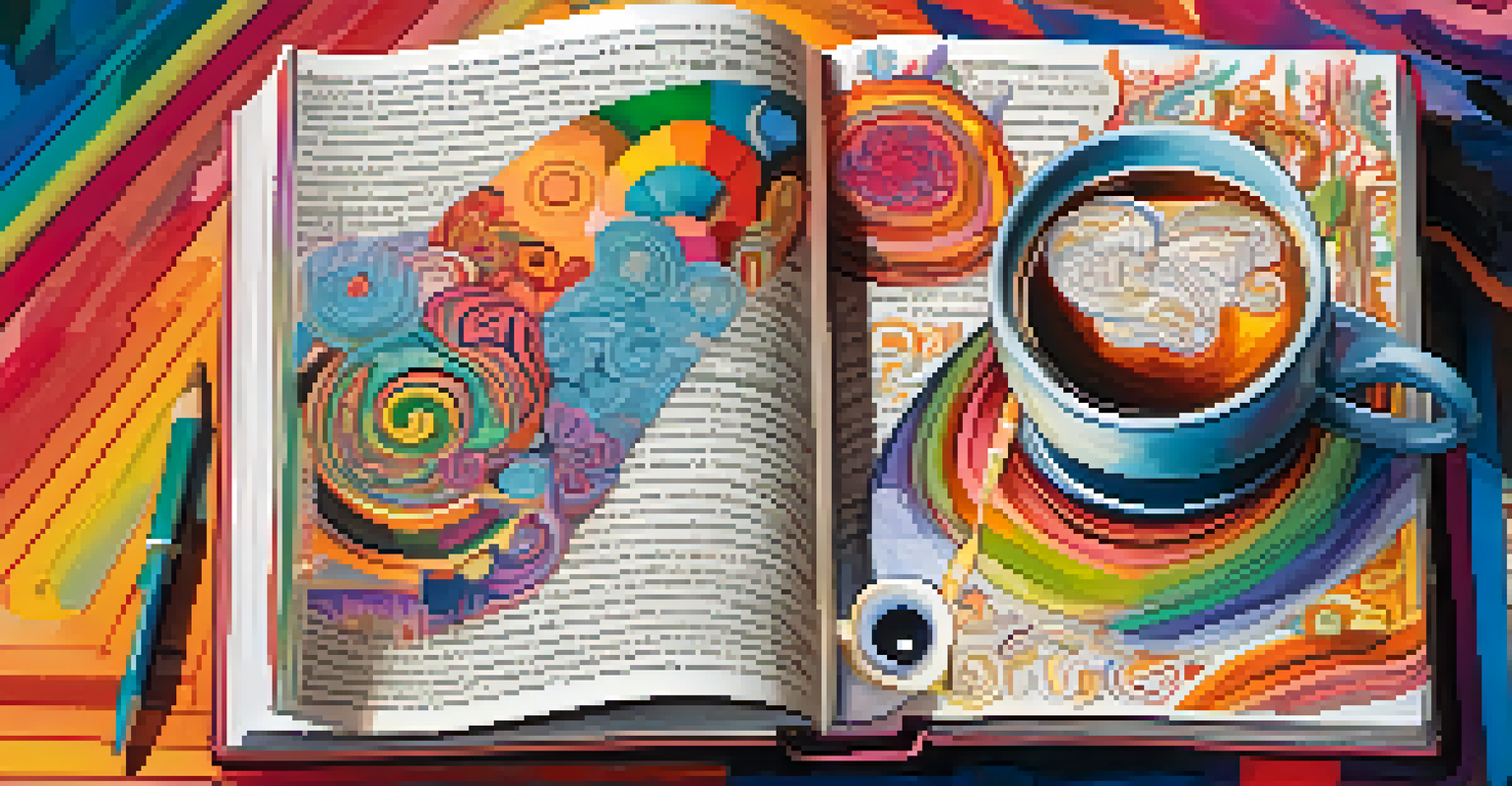Psychedelics and Their Role in Shaping New Language Forms

Understanding Psychedelics: More Than Just Substances
Psychedelics, often mischaracterized as merely recreational drugs, have a deeper significance in human culture. These substances, such as LSD, psilocybin, and ayahuasca, have been used for centuries in spiritual and therapeutic contexts. They alter perception and consciousness, allowing users to experience the world in profoundly different ways.
Psychedelics are a tool that can help us explore the depths of our consciousness, allowing us to break free from the confines of traditional thought.
As users navigate these altered states, they often find themselves encountering new ways of thinking and communicating. This can lead to unique insights about language, expression, and understanding. The mind's expansion during these experiences opens doors to creative avenues that may have previously been closed.
Ultimately, psychedelics can serve as a catalyst for linguistic evolution, pushing individuals to explore new forms and styles of communication. This exploration can inspire art, poetry, and even new dialects that reflect these experiences.
The Connection Between Psychedelics and Language
Language is a living entity, constantly evolving to reflect humanity's experiences. Psychedelics can accelerate this evolution by introducing novel concepts and ideas that challenge conventional linguistic structures. When individuals share their psychedelic experiences, they often create new words or phrases that capture the essence of their journey.

For example, terms like 'trip' or 'journey' have taken on new meanings in the context of psychedelics, transcending their traditional definitions. This shift not only enriches the vocabulary but also encourages deeper discussions about consciousness and existence. Through this lens, language becomes a tool for expressing the ineffable.
Psychedelics Enhance Language Evolution
Psychedelics can accelerate the evolution of language by introducing new concepts and shared terminology among users.
Moreover, the communal aspects of psychedelic experiences foster a shared language among users. As people recount their journeys, they often adopt shared terminology that resonates within the community, creating a unique dialect that strengthens their bond.
Psychedelics in Literature: A New Wave of Expression
Throughout history, many writers and poets have turned to psychedelics for inspiration. The Beat Generation, for instance, embraced these substances to break free from conventional narratives and explore the depths of human experience. Their work often reflects an innovative use of language that captures the essence of their psychedelic experiences.
The use of psychedelics can lead to a profound expansion of consciousness, fostering a new way of seeing and expressing the world around us.
Authors like Aldous Huxley and Jack Kerouac have famously woven their psychedelic journeys into their literary styles, creating vibrant, flowing prose that mirrors the fluidity of thought experienced during these states. This blending of experience and expression highlights how psychedelics can influence not just what is said, but how it is said.
As contemporary writers continue to explore psychedelics, we see a resurgence of bold, experimental language. New forms of storytelling are emerging, pushing the boundaries of traditional literature and inviting readers to engage with language in fresh, exciting ways.
Cultural Narratives: Psychedelics and Community Language
Psychedelics have often played a role in shaping cultural narratives and communal identities. In many indigenous cultures, these substances are integral to rituals and ceremonies, fostering a collective language that reflects shared beliefs and experiences. This communal aspect of psychedelics reinforces the idea that language is not just an individual endeavor but a communal one as well.
As individuals come together to share their psychedelic experiences, they create a unique lexicon that encapsulates their collective understanding. This shared language allows for deeper connections and a sense of belonging within the community. It becomes a way to communicate feelings and insights that transcend everyday language.
Psychedelics Influence Literature
Writers and poets have historically used psychedelics for inspiration, resulting in innovative language and storytelling techniques.
Furthermore, these cultural narratives often challenge dominant linguistic frameworks, paving the way for new forms of expression that honor diverse perspectives. By embracing the influence of psychedelics, communities can cultivate a language that resonates with their shared experiences and values.
Psychological Insights: How Psychedelics Shape Thought Patterns
Psychedelics are known to alter thought patterns, leading to unique ways of processing and articulating experiences. This shift can result in a more fluid and associative style of thinking, which often manifests in language. Users may find themselves breaking away from linear narratives, opting instead for a more poetic or abstract approach.
For example, someone on a psychedelic journey might describe their experience in metaphors that evoke vivid imagery rather than relying on straightforward language. This can create a richer, more immersive experience for the listener or reader, inviting them to engage with the narrative on multiple levels.
These psychological shifts can also lead to a broader understanding of language itself, as individuals begin to appreciate the nuances and complexities of communication. This newfound awareness can inspire a desire to explore and experiment with language in ways that reflect their unique perspectives.
The Role of Psychedelics in Modern Language Evolution
In today's digital age, the influence of psychedelics on language continues to evolve. Social media platforms and online communities have become spaces where users share their psychedelic experiences and the language that emerges from them. This digital landscape allows for new forms of communication that blend traditional language with innovative expressions.
As people share their insights and experiences online, they contribute to a growing lexicon that reflects contemporary psychedelic culture. Terms like 'set and setting,' which refer to the mindset and environment during a psychedelic experience, have entered mainstream discussions, showcasing the impact of these substances on our collective language.
Cultural Narratives Shape Communication
In many cultures, psychedelics foster communal identities and unique lexicons that enhance connections and understanding among community members.
Moreover, this evolution is not limited to individual expression; it extends into the realms of art, music, and even marketing. The integration of psychedelic-inspired language into various cultural forms can help challenge societal norms and promote a more open dialogue about consciousness and experience.
Looking Ahead: The Future of Language and Psychedelics
As research into psychedelics continues to expand, so too does the potential for their influence on language. With a growing acceptance of these substances in therapeutic and cultural contexts, we may see a shift in how language is used to articulate complex experiences. This could lead to a new era of communication that embraces the nuances of consciousness.
In the future, we may witness more interdisciplinary collaborations between linguists, psychologists, and artists exploring the interplay between psychedelics and language. Such collaborations could lead to innovative approaches to communication that challenge traditional boundaries and encourage deeper understanding.

Ultimately, the relationship between psychedelics and language is a dynamic and evolving one. As we continue to explore the depths of these substances, we can expect to see new forms of expression that reflect the rich tapestry of human experience.